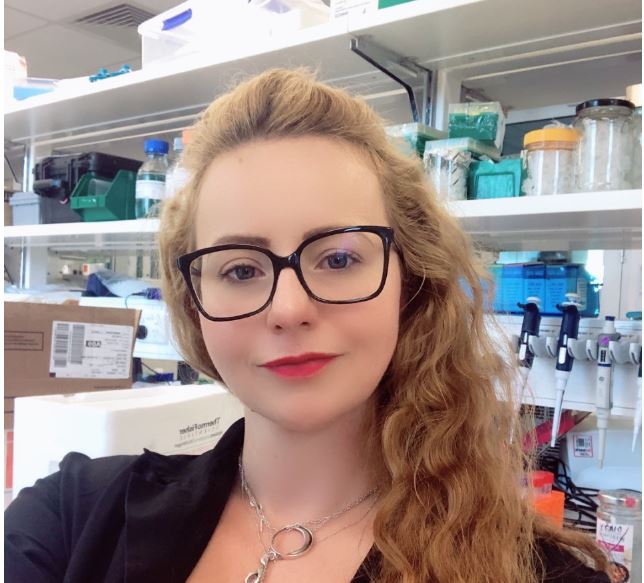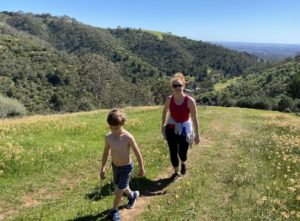
Born in Poland, Dr Marta Gabryelska has come to Flinders as a Postdoctoral Researcher in Molecular Biology – but her research into cancer cells occupies only part of her time. We talk with her about the exciting STEMcognito online platform she has helped establish to promote researcher videos internationally.
What journey has brought you to this point in your career?
I did my PhD in Poland and I’m very interested in transcriptomics. I worked on application of RNA interference in brain tumour therapy, ncRNAs profile characterising non-neoplastic and tumour brain tissues, and new therapeutic tools based on catalytic RNAs. During my postdoc in Scotland, I developed a new method for tracking RNA-RNA interactions within cells and learning bioinformatics approaches to analyse the data during ribosome assembly and Zika virus infections. After that, I found my second postdoctoral position in Australia.
What does your work focus on?
I’m an RNA biochemist specialising in RNA interactomics, and joined Flinders University and the Circular RNAs in Cancer Laboratory of Associate Professor Simon Conn as a postdoctoral researcher in June 2019. I immediately started working on circular RNA-protein interactions, optimizing circRNA capture methods as well as helping with bioinformatic analysis of data in the laboratory. I’m currently finishing profiling circRNA-RNA interaction in human cells, improving the method to capture such interactions in the future, and building a new prototype of machine that could do it (with Dr Ula Alexander, College of Science and Engineering).
I’m preparing experiments to capture RNA-RNA interactions in prostate cancer and healthy prostate cells to discriminate neutral interactions from oncogenic ones – projects that have been generously supported by Flinders University’s Kickstart Grant for early career researchers and a Cross-College Grant. I absolutely love innovation and working on new methods, especially if it involves crossing the line between disciplines – and I’m now wrapping everything up and writing three papers simultaneously.
Can you describe a challenge in your life and how you dealt with it?
In my recent essay Science: Priceless, but Costly, I describe that I got scooped and the project I was working on for 2.5 years could never be published. It causes a gap in my academic CV which is very hard to fill. In that same year I was getting divorced, with soon to be my ex-husband leaving the UK, so I became a single mother with two young kids (2 and 5 years old) and no family around to help. A friend told me later that it was to teach me a lesson. Well, what it taught me is that I can completely manage the situation on my own (I hired an au-pair and slept on the sofa for the next two years).
On the scientific side, I learned bioinformatics, so now I can do laboratory work and also data analysis. As I revealed in my recent STEMterview, when life gives you lemons, don’t stop with making lemonade – you make lemon curd, lemon pie, use lemons skin in a dishwasher or for cleaning, and add a slice to gin and tonic!
What is something you are most proud of?
Last December, I posted on social media that I’d create a platform where scientists and other STEM professionals can share their talks. I’m very proud that I had courage to do this. Together with four researchers in different countries, we co-founded STEMcognito, which I lead as CEO. It’s a new public engagement video communication platform, providing a trusted repository of verified scientific and academic video content, in a user-friendly, well-designed environment. It allows viewers to choose from four main subjects and several subfields, with differing levels of complexity, thereby ensuring widespread public engagement opportunities.
Our platform also supports scientific communication skills development, with researchers able to experience live feedback from the public and fellow professionals, thus widening the impact of the platform. STEMcognito is the only platform that supports outreach (expert to non-expert) and “inreach” (expert to expert) communication, with the aim of bringing scientists and non-scientists closer together.
STEMcognito gives a voice to researchers and eliminates costly stages of specialist video production (such as animations or dubbing). It encourages researchers to fully promote their existing resources, such as conference presentations, and is free from time zone and location limitations.
I’m very proud of this achievement, as I never imagined I would start a company. Encouraged by this, I’m now considering a start-up biotech company within the next few years.
What does a normal day look like for you?

I love getting up early, at 6am, or even 5am in summer. This is a peaceful time, just for me and my coffee. It also gives me a possibility to make a start with my STEMcognito work. I call this is my first work shift. I take my kids to school around 8.40am and then go to work to do my second shift, which is exciting research at Flinders. After work I go jogging, sometimes with my kids, who accompany me on their scooters. I feel like I have two bodyguards with me. After that, it’s time for dinner preparation, family chats and everything that my third daily shift (which is being a mum) includes. After 8pm, it’s time for everyone to relax – and maybe watch some interesting shows – before bedtime at 10pm.
How do you like to spend your spare time?
I actually have very little spare time. Being employed full-time, running my not-for-profit company and being a mother means there’s not much time left. However, I’m trying to mindfully enjoy every spare minute I have. On weekends, we go bushwalking. I usually rest on Saturday, and on Sunday I do STEMcognito work. I also like doing gardening, and some DIY – either building things and repairing things. It gives me great satisfaction to do anything that was traditionally perceived as a “male” job, like chopping wood or fixing furniture. I am also learning to sing, and I’ve recorded a few cover songs so far. Singing is something that helps me deal with daily struggles – as well as celebrating successes.

